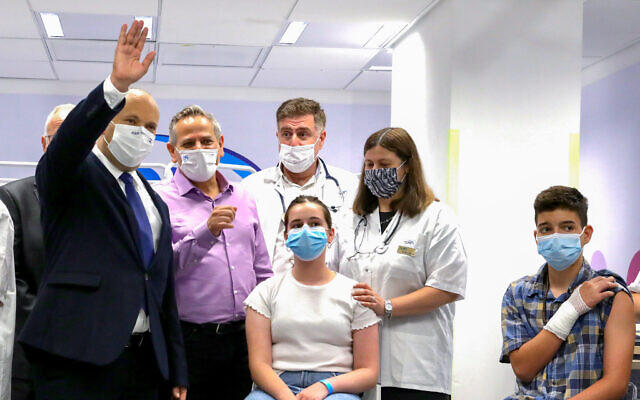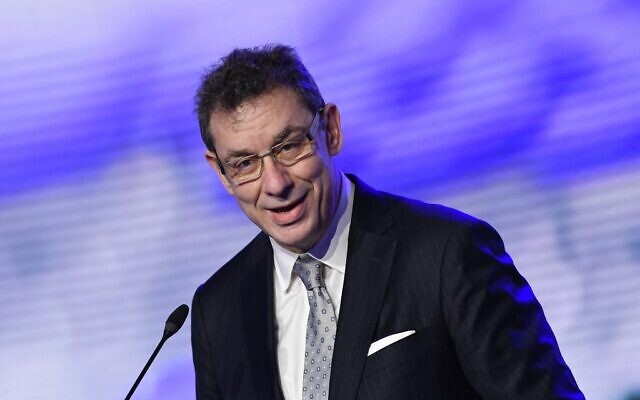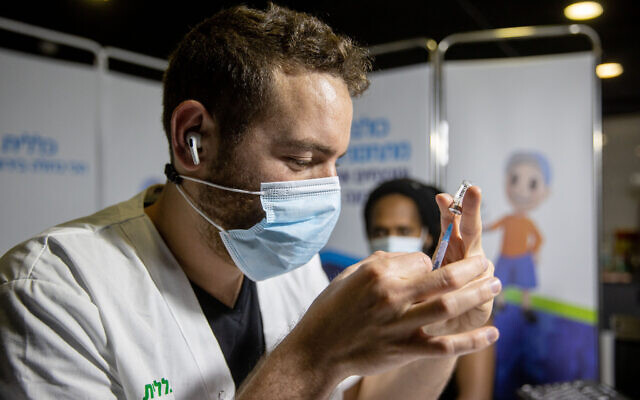PM and Albert Bourla also discuss possible swap with other nations of immunizations on brink of expiration date; Health Ministry to recommend 3rd booster shot for immunocompromised

Prime Minister Naftali Bennett on Sunday spoke to Pfizer CEO Albert Bourla on the supply of additional vaccines to Israel, as the country raced to immunize preteens and teenagers amid a resurgence of the virus and as the Health Ministry was reportedly poised to recommend a third booster shot for the immunocompromised.
“The two discussed strategies for dealing with the virus, with an emphasis on existing and future variants, as well as the possibilities for supplying additional Pfizer vaccines to Israel,” Bennett’s office said.
Israel purchased millions of vaccines from Pfizer and was among the first countries to receive them late last year, for an undisclosed amount. Despite having millions of unused doses, it inked a deal in April under former prime minister Benjamin Netanyahu for 18 million more doses, in case they are needed for booster shots. Those doses have yet to arrive.
Israel has a reported 1.4 million doses set to expire at the end of July and Bennett is hoping to use as many of them as possible by getting 300,000 kids age 12-15 vaccinated by July 9, leaving enough time for a second dose.
“In addition, the Prime Minister and CEO of Pfizer discussed possible deals to exchange vaccines between Israel and various countries,” the statement from the Prime Minister’s Office said.
A swap deal would see Israel provide the doses now to a recipient nation and in return receive one of that nation’s future shipments from Pfizer. If Israel fails to find buyers, vaccine doses worth hundreds of millions of dollars could be thrown away within weeks.
According to a Channel 12 report Wednesday night, to prevent vaccines from being tossed, Israel engaged in advanced talks with the UK to provide millions of Pfizer vaccines within days in return for London supplying it with one of its future shipments from Pfizer at a later date. That agreement appeared to have fallen through but Jerusalem is now in contact with two other countries regarding a possible swap, according to reports on Friday.

Over 5.62 million people — out of Israel’s population of more than 9.3 million — have gotten at least one vaccine shot. Of those, close to 5.2 million received a second dose.
Third dose for immunocompromised
The Health Ministry will recommend that immunocompromised Israelis take a third dose of the Pfizer-BioNTech vaccine, though the pharmaceutical company has not yet sanctioned the booster shot, according to Hebrew media reports on Sunday.
Health officials are concerned by data that shows immunocompromised people develop an insufficient antibody response from the two-shot vaccine to shield them from the virus.
The recommendation was not immediately confirmed by the ministry.
Immunocompromised individuals include organ transplant recipients and cancer patients.

Israel has seen some 300 daily coronavirus cases in recent days, the highest rate since April, amid a resurgence of COVID-19 in the heavily vaccinated country.
On Tuesday, the high-level coronavirus cabinet will meet to discuss whether to reinstate additional restrictions in Israel to drive down virus cases.
With case numbers rising, Israel has thus far reimposed an indoor mask mandate, cracked down on travelers arriving from countries with high infection rates, and enforced quarantine for new arrivals more strictly, but has sought to avoid a return to the restrictions it largely emerged from over the last two months.
The spike in cases, blamed on the ultra-infectious Delta variant, comes as Israel races to vaccinate its preteens and teenagers aged 12-15.
The ministry expects daily diagnoses to jump to 500-600 next week, according to media reports.

The Delta variant of the virus, first identified in India, is more contagious than other variants and may be better able to bypass vaccines, but is believed to not generally cause serious infection among the vaccinated.
The variant is thought to be around 40% more contagious than the original strain, according to the United Kingdom’s public health agency. The effectiveness of two vaccine doses for protection from hospitalization is at 96%, according to the agency.
As reported by The Times of Israel
